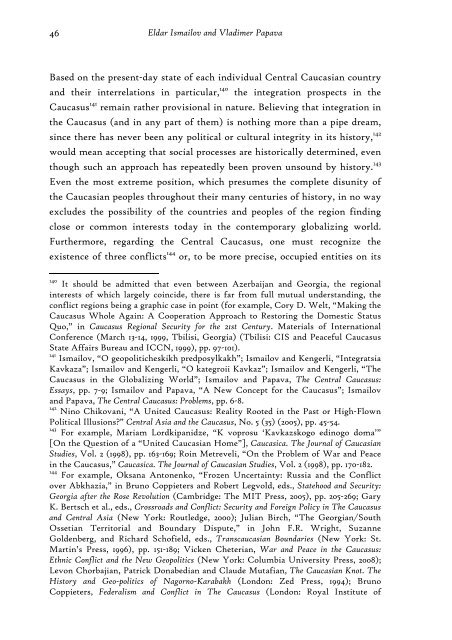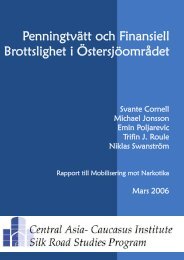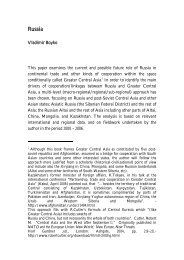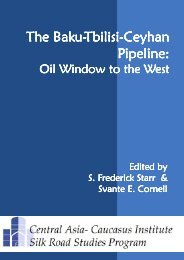Eurasianism and the Concept of Central Caucaso-Asia
Eurasianism and the Concept of Central Caucaso-Asia
Eurasianism and the Concept of Central Caucaso-Asia
Create successful ePaper yourself
Turn your PDF publications into a flip-book with our unique Google optimized e-Paper software.
46<br />
Eldar Ismailov <strong>and</strong> Vladimer Papava<br />
Based on <strong>the</strong> present-day state <strong>of</strong> each individual <strong>Central</strong> Caucasian country<br />
<strong>and</strong> <strong>the</strong>ir interrelations in particular, 140 <strong>the</strong> integration prospects in <strong>the</strong><br />
Caucasus 141 remain ra<strong>the</strong>r provisional in nature. Believing that integration in<br />
<strong>the</strong> Caucasus (<strong>and</strong> in any part <strong>of</strong> <strong>the</strong>m) is nothing more than a pipe dream,<br />
since <strong>the</strong>re has never been any political or cultural integrity in its history, 142<br />
would mean accepting that social processes are historically determined, even<br />
though such an approach has repeatedly been proven unsound by history. 143<br />
Even <strong>the</strong> most extreme position, which presumes <strong>the</strong> complete disunity <strong>of</strong><br />
<strong>the</strong> Caucasian peoples throughout <strong>the</strong>ir many centuries <strong>of</strong> history, in no way<br />
excludes <strong>the</strong> possibility <strong>of</strong> <strong>the</strong> countries <strong>and</strong> peoples <strong>of</strong> <strong>the</strong> region finding<br />
close or common interests today in <strong>the</strong> contemporary globalizing world.<br />
Fur<strong>the</strong>rmore, regarding <strong>the</strong> <strong>Central</strong> Caucasus, one must recognize <strong>the</strong><br />
existence <strong>of</strong> three conflicts 144 or, to be more precise, occupied entities on its<br />
140 It should be admitted that even between Azerbaijan <strong>and</strong> Georgia, <strong>the</strong> regional<br />
interests <strong>of</strong> which largely coincide, <strong>the</strong>re is far from full mutual underst<strong>and</strong>ing, <strong>the</strong><br />
conflict regions being a graphic case in point (for example, Cory D. Welt, “Making <strong>the</strong><br />
Caucasus Whole Again: A Cooperation Approach to Restoring <strong>the</strong> Domestic Status<br />
Quo,” in Caucasus Regional Security for <strong>the</strong> 21st Century. Materials <strong>of</strong> International<br />
Conference (March 13-14, 1999, Tbilisi, Georgia) (Tbilisi: CIS <strong>and</strong> Peaceful Caucasus<br />
State Affairs Bureau <strong>and</strong> ICCN, 1999), pp. 97-101).<br />
141 Ismailov, “O geopoliticheskikh predposylkakh”; Ismailov <strong>and</strong> Kengerli, “Integratsia<br />
Kavkaza”; Ismailov <strong>and</strong> Kengerli, “O kategroii Kavkaz”; Ismailov <strong>and</strong> Kengerli, “The<br />
Caucasus in <strong>the</strong> Globalizing World”; Ismailov <strong>and</strong> Papava, The <strong>Central</strong> Caucasus:<br />
Essays, pp. 7-9; Ismailov <strong>and</strong> Papava, “A New <strong>Concept</strong> for <strong>the</strong> Caucasus”; Ismailov<br />
<strong>and</strong> Papava, The <strong>Central</strong> Caucasus: Problems, pp. 6-8.<br />
142 Nino Chikovani, “A United Caucasus: Reality Rooted in <strong>the</strong> Past or High-Flown<br />
Political Illusions?” <strong>Central</strong> <strong>Asia</strong> <strong>and</strong> <strong>the</strong> Caucasus, No. 5 (35) (2005), pp. 45-54.<br />
143 For example, Mariam Lordkipanidze, “K voprosu ‘Kavkazskogo edinogo doma’”<br />
[On <strong>the</strong> Question <strong>of</strong> a “United Caucasian Home”], Caucasica. The Journal <strong>of</strong> Caucasian<br />
Studies, Vol. 2 (1998), pp. 163-169; Roin Metreveli, “On <strong>the</strong> Problem <strong>of</strong> War <strong>and</strong> Peace<br />
in <strong>the</strong> Caucasus,” Caucasica. The Journal <strong>of</strong> Caucasian Studies, Vol. 2 (1998), pp. 170-182.<br />
144 For example, Oksana Antonenko, “Frozen Uncertainty: Russia <strong>and</strong> <strong>the</strong> Conflict<br />
over Abkhazia,” in Bruno Coppieters <strong>and</strong> Robert Legvold, eds., Statehood <strong>and</strong> Security:<br />
Georgia after <strong>the</strong> Rose Revolution (Cambridge: The MIT Press, 2005), pp. 205-269; Gary<br />
K. Bertsch et al., eds., Crossroads <strong>and</strong> Conflict: Security <strong>and</strong> Foreign Policy in The Caucasus<br />
<strong>and</strong> <strong>Central</strong> <strong>Asia</strong> (New York: Routledge, 2000); Julian Birch, “The Georgian/South<br />
Ossetian Territorial <strong>and</strong> Boundary Dispute,” in John F.R. Wright, Suzanne<br />
Goldenberg, <strong>and</strong> Richard Sch<strong>of</strong>ield, eds., Transcaucasian Boundaries (New York: St.<br />
Martin’s Press, 1996), pp. 151-189; Vicken Cheterian, War <strong>and</strong> Peace in <strong>the</strong> Caucasus:<br />
Ethnic Conflict <strong>and</strong> <strong>the</strong> New Geopolitics (New York: Columbia University Press, 2008);<br />
Levon Chorbajian, Patrick Donabedian <strong>and</strong> Claude Mutafian, The Caucasian Knot. The<br />
History <strong>and</strong> Geo-politics <strong>of</strong> Nagorno-Karabakh (London: Zed Press, 1994); Bruno<br />
Coppieters, Federalism <strong>and</strong> Conflict in The Caucasus (London: Royal Institute <strong>of</strong>






